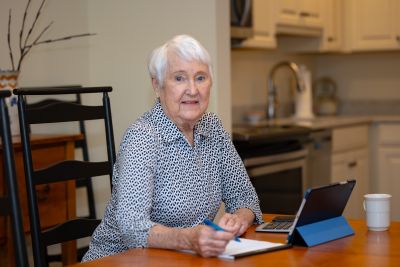 Trying to make a senior living decision – such as whether to remain in your home or move to a retirement community – can evoke many feelings and emotions, among them: fear. More specifically, this apprehension often manifests in the form of the fear of the unknown – that unsettling sensation that creeps in when we face nearly any substantial life change, the unfamiliar, or the unpredictable. It can be downright paralyzing. So, how can older adults overcome their fear of the unknown in senior living decisions?
Trying to make a senior living decision – such as whether to remain in your home or move to a retirement community – can evoke many feelings and emotions, among them: fear. More specifically, this apprehension often manifests in the form of the fear of the unknown – that unsettling sensation that creeps in when we face nearly any substantial life change, the unfamiliar, or the unpredictable. It can be downright paralyzing. So, how can older adults overcome their fear of the unknown in senior living decisions?
The primal origins of the fear of the unknown
Fear of the unknown is a deeply ingrained aspect of human psychology. Better understanding its etiology and learning strategies to manage it can empower us to live more freely and confidently, as well as enable us to move forward with less anxiety around decision-making.
From an evolutionary perspective, humans developed a natural aversion to the unknown as a survival mechanism. Consider the lives of early humans, who faced very real dangers from unpredictable environments and situations. The fear of the unknown acted as a protective cautionary tool, prompting them to avoid potential threats.
Although our modern world is far less perilous, these instincts ingrained in our ancestors’ psyche still influence us at a primal level. Consider a few common fears that persist in many modern-day people — the fear of snakes and heights — and how these may have imperiled early humans.
So, while we no longer have to worry about saber-tooth tiger attacks in this day and age, our primal fear of the unknown is still alive and very real for many people — whether it is retiring from a long-time career, receiving a new medical diagnosis, or making a senior living decision.
Root causes of our modern-day fear of the unknown
Among the sentiments that lay at the heart of the fear of the unknown is feeling a lack of control. Such uncertainty often brings with it a sense of vulnerability. When we can’t predict or control a situation’s outcome, it’s easy to feel overwhelmed. This lack of control disrupts our mental equilibrium, often making us even more anxious about the “what ifs” of our circumstances.
But maybe as important, our fear of the known is closely tied to humans’ anxieties around the uncertainty of change. Our brains are wired to seek patterns and predict outcomes, referred to as cognitive biases. When faced with uncertainty, we may be prone to cognitive biases such as catastrophizing, where we imagine the worst possible scenarios. This tendency only amplifies our fear and anxiety.
Nicholas Carleton, a psychology professor at the University of Regina in Canada has researched how people respond to life’s unpredictability. He and other psychologists have referred to the fear of the unknown as perhaps “the fundamental fear” for humankind and “one fear to rule them all,” one which underlies most anxieties.
Carleton said that for early humans, “treating unknowns as potential threats would have been adaptive, as long as the associated anxiety did not compromise [essential tasks] such as seeking food and shelter or selecting mates.” He noted that such fight-or-flight cautionary apprehension was perhaps even more influential to humans’ behavior than our intrinsic fear of death.
 Adapting to and even embracing change
Adapting to and even embracing change
Although it is very normal for people of any age to experience some degree of fear of the unknown as it accompanies any change, the good news for older adults is that we are entirely capable of adapting to change. In fact, some research shows that senior adults are equally or even better equipped to deal with change than their younger counterparts. And this can have positive implications for those experiencing fear of the unknown in senior living decisions.
For instance, a 2020 meta-analysis study found that older adults were just as likely as middle-aged adults to benefit from psychotherapy for depression. But maybe more relevant to the fear of the unknown as related to making a senior living decision are certain unique qualities possessed more frequently by older adults.
Older adults maintain strong levels of something called “crystallized intelligence,” which encompasses the general knowledge and experiences accumulated over a person’s lifetime. This know-how gained through life experiences can translate into a better ability to learn new related skills.
But maybe just as important, research by German psychologists at the Max Planck Institute for Human Development supports the idea that senior adults are not only more likely than younger people to set goals around intrinsic values like safety and wellbeing (as opposed to extrinsic values like money), they also show a higher level of commitment to reaching those objectives. What’s more, intrinsic-based goals have been shown to result in more lasting changes to behaviors.
Adjusting to life’s unknowns
While most people probably experience some level of fear of the unknown in making a choice among their various senior living options, It’s hard to deny that this is a decision that is closely tied to a person’s intrinsic values. And as research shows, it is entirely possible to overcome these fears.
For example, Professor Carleton notes in his analysis of the fear of the unknown that, “Humans and closely related non-human animals (e.g., bonobos) prefer certainty to risk, but adapt based on learning history (e.g., the aggregate of encounters with unknowns) and situational variables (e.g., the relative number of knowns and unknowns.”
He continues: “Non-human primate infants initially respond to unknowns with fear and anxiety, but rapidly habituate in the absence of aversive consequences.” He goes on to note that other young mammals frequently progress to curiosity around new situations and stimuli once their initial fear subsides.
In other words, as with other primates and mammals, life experiences can ease anxiety around the unknown and even elicit curiosity. Older adults’ crystalized intelligence and life experiences can help them not only adapt to unknowns and change but actually even embrace it.
Overcoming the fear factor of senior living decisions
If you are experiencing fear of the unknown as it relates to your senior living decision, here are a few pointers on how to overcome it:
Avoid avoidance
 The longer you put off facing a situation, the more challenging it can become to confront it. Avoidance is a common tactic among those considering a senior living move because they feel overwhelmed by making a choice and then completing the tasks needed to enact it (like downsizing). Consider taking proactive steps to re-engage with your senior living decision to make it more manageable, such as committing to cleaning out one closet or room per week.
The longer you put off facing a situation, the more challenging it can become to confront it. Avoidance is a common tactic among those considering a senior living move because they feel overwhelmed by making a choice and then completing the tasks needed to enact it (like downsizing). Consider taking proactive steps to re-engage with your senior living decision to make it more manageable, such as committing to cleaning out one closet or room per week.
It’s also worth noting that while fear of the unknown can cause older adults to avoid a senior living move, there can also be a lot of unknowns with staying in your current home (though the familiarity may initially mask that reality). In fact, if a person’s care needs reach a point where home care is no longer practical, safe, or affordable, it could open the door to many more unknowns.
Identify root causes of your fear
Fear can often arise from discomfort, a sense of losing control, past trauma, or negative life experiences. Take time to explore what might be contributing to your fear of the unknown in senior living decisions. Understanding the underlying causes can provide insight and guide you toward addressing the issues you need to work through to overcome your fears.
For instance, identify factors that you can control — such as which specific community you will move to and which type of residence — and make one small step toward your decision each day to strengthen your sense of self-reliance.
Do your own research
Having insufficient information about a situation can evoke anxiety and fear, so you often can reduce your fear of the unknown by gaining additional knowledge. That’s why it’s so crucial to thoroughly research your various senior living choices. (myLifeSite is a great place to begin this research!) With increased information, making your senior living decision might become easier.
This research-focused approach is especially crucial if your fear of the unknown in senior living decisions involves financial matters. Gaining a better understanding of your senior living budget may feel intimidating at first, but doing so will enable you to make a more informed choice.
Inform your choice with first-hand information
Often, simply identifying and talking through your fears can help diminish their impact. Consider discussing your fears about your senior living decision with a trusted friend or recording your thoughts in a private journal.
It can also be extremely helpful to talk with others who have already made their senior living choice – whether it be to remain in their home or to move to a retirement community. Their first-hand experiences – whether good, bad, or neutral – can provide valuable insights and guidance to better-inform your decision and boost your confidence in your ultimate choice.
By myLifeSite
